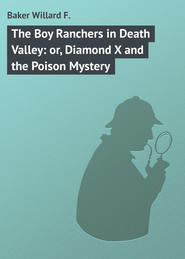По всем вопросам обращайтесь на: info@litportal.ru
(©) 2003-2024.
✖
Bob Dexter and the Storm Mountain Mystery or, The Secret of the Log Cabin
Настройки чтения
Размер шрифта
Высота строк
Поля
“Well, I guess we’d just better let him alone.”
“Sure. He won’t thank us for butting in, and if he wants any help he knows we’ll give it to him.”
“Sure.”
Thereupon the two chums had gone off nutting again, leaving Bob Dexter to his own devices.
Taking advantage of the fact that there were few late arrivals in the Mansion House, which, unlike the Railroad hotel, did not keep open all night, Bob made his entry as an unregistered guest in his little room about two o’clock one morning. Mr. Beel was the only one around at the time.
“Good luck to you, Bob,” the proprietor had said, as he watched the lad enter his room quietly. “He’s in there,” and he motioned to the apartment of Jolly Bill and his wooden leg.
Bob’s first activity, after settling himself, was to mount on a chair and examine, as best he could in the feeble light of one electric bulb in his room, the transom over the door between his apartment and that of Jolly Bill.
At one time these two rooms had formed part of a suite, but when there was little call except for single rooms, the transom had been closed and painted black to prevent surreptitious views from one room to the other.
“And the paint’s on my side,” exclaimed Bob. “That makes it easier. I’ll scrape a peep-hole in the morning, after Jolly Bill goes out.”
Bob was concentrating his efforts and suspicions on this wooden-legged sailor now, since all efforts to trace the man with the iron hook, and his companion, had failed.
Bob did not sleep very well the remainder of that night. His mind was too filled with the possibilities that might follow his action. But toward morning he fell asleep, and the early winter sun was quite high when he opened his eyes.
“Gosh,” he exclaimed in a whisper. “I ought to have been up long ago. Wonder if he’s gone out?”
He listened but could hear no sound from the next room.
“I wish I hadn’t gone to sleep,” mused Bob, rather chagrined at himself. “Maybe he’s flown the coop and gone out on the milk train.”
But he was reassured, a little later, by hearing the voice of Jolly Bill himself. The voice followed a knock on his door – evidently a summons to arise – for there were no room telephones in the Mansion House. A chambermaid or bell boy had to come up and knock on the doors of guests to arouse them in case they requested such attention.
“All right I All right!” sounded the voice of the man with the wooden leg. “All right! I’m getting up! Got lots to do to-day!”
This was rather amusing, from the fact that since he had arrived in Cliffside Jolly Bill had done nothing in the line of work – unless digging worms to go fishing could be so called.
“All right! I’m on the job, too!” said Bob, silently to himself. Quickly he mounted to a chair which raised him so that he could look through the transom over his door. He moved silently. He did not want Bill to know, if it could be avoided, that there was a guest in the next room.
With the point of a knife blade, Bob removed a little of the black paint on his side of the transom. It gave him a peep-hole and he applied his eye to it.
Rather a mean and sneaking business, this of spying through peep-holes, the lad thought. The only consolation was that he was going through it in a good cause – his desire to bring criminals to justice and aid Hiram Beegle.
To Bob’s delight he found that he had a good view of the interior of Jolly Bill’s room, and he had sight of that individual himself, sitting on the edge of his bed and vigorously stretching himself as a preliminary to his morning ablutions.
Bill’s wooden leg was unstrapped from the stump, and lay on a chair near him, as did the heavy cane he used to balance himself, for he was a stout man.
“It couldn’t be better – if it works out the way I think it will,” mused the lad. Eagerly and anxiously he watched now for the next move on the part of the old sailor. For it was on this move that much might depend.
Having stretched himself, and rubbed his eyes to remove therefrom as much as possible of the “sleep,” by a process of dry washing, Jolly Bill prepared for his day’s activities by reaching out for his wooden leg.
“Now,” whispered Bob to himself, as he stood gazing through his peep-hole in the painted transom, “am I right or am I wrong? It won’t take long to tell if things work out the way I expect they will. Steady now!” he told himself.
Jolly Bill pulled his wooden leg toward him as he sat on the bed. He must strap it on before he could begin stumping about to begin his day of “work,” whatever that mysterious occupation was.
And then, as Bob watched, the old sailor, with a look toward the window, to make sure the shades were pulled down, plunged his hand into the interior of his wooden leg.
This artificial limb, like many of its kind, was hollow to make it lighter. There was quite a cavity within.
Another look toward the curtained window, but never a glance did Jolly Bill bestow on the painted transom over the door between his room and the cubbyhole. Why should he look there? No one had occupied it since he had been in the Mansion House. And it was unoccupied when Bill went to bed last night. He had made sure of that as he always did. But Bob had come in since.
And then, as the young detective peered through his peep-hole, he saw a sight which thrilled him.
For, from the hollow interior of his wooden leg, Jolly Bill pulled out the brass-bound box that had been so mysteriously stolen from the strong room of Hiram Beegle – the strong room which was locked in such a queer way, with the key inside and the criminal outside.
Jolly Bill held up the brass box, and smiled as he observed it.
“I guess,” he murmured, “I guess it’s about time I had another go at you, to see if I can get at what you mean. For blessed if I’ve been able to make head or tail of you yet! Not head or tail!”
And, sitting on the bed, his wooden leg beside him, Jolly Bill Hickey began fumbling with the brass box.
The eyes of Bob Dexter shone eagerly.
CHAPTER XXIII
SOLVING A PUZZLE
Many a detective, amateur or professional, having seen what Bob Dexter saw through the scratched hole in the painted transom, would have rushed in and demanded the box which held the secret of the buried treasure. But Bob knew that his case was only half completed when he discovered who had the box.
Up to within a few days ago he had suspected the mysterious and missing Rod Marbury. But with the linking up of that character with the organ grinder, and the departure of the latter with the hook-armed man, Bob had to cast some new theories.
Now he had succeeded beyond his wildest hopes, but still he was not ready to spring the trap. There were many things yet to be established.
True, there was the brass box, and as Bill, with his wooden leg not yet strapped to his stump sat looking at it on the edge of his bed, Bob could not but believe that it was the treasure box willed to Hiram Beegle, and stolen from that old sailor.
The half-whispered, exulting words of Jolly Bill himself as he eagerly eyed the box proved it to be the one sought. But Bill’s words also indicated that there was still some mystery connected with the casket – some secret about it that needed solving.
For the wooden-legged man had said:
“I’ve not been able to make head or tail of you – not head or tail!”
That indicated a failure to ascertain the hiding place of the gold buried by Hank Denby.
“But Bill’s had a try for it,” mused Bob as he watched the man. “That digging of fish worms was only a bluff. He was digging to see if the treasure might not be buried on Hiram’s place.
“And that story of monkey nuts – that was bluff, too. The Italian, or whatever Rod is, was digging for the treasure. But he didn’t have whatever is in the box to guide him. Now I wonder what’s in that box?”
Bob did not have to wait long in wonder, for the wooden-legged man, after fumbling with what seemed to be a complicated lock or catch, opened the brass-bound box, and took out a folded paper. That was all there was in the box it seemed, bearing out Hiram’s story to the effect that Hank had left him directions for finding the treasure – a most peculiar proceeding. But then the whole story of digging up the treasure on the South Sea island was peculiar – like a dream, Bob thought. Sometimes he found himself doubting the whole yarn.
But there was a paper in the brass box, that was certain, and Jolly Bill had gone to considerable trouble, not to say risk, in securing it. He had played his cards well, not to have been suspected by Hiram, Bob thought.
“But if Bill, smart as he is, can’t make head or tail of that paper, which tells where the treasure is buried, how can Hiram do so?” mused Bob. “He hasn’t as much education as Bill has. They were all common sailors, though Hank may have been the best educated – he probably was. But he would know Hiram couldn’t solve any complicated directions for digging up buried treasure, so he would have to leave him simple rules to follow.










